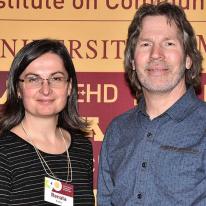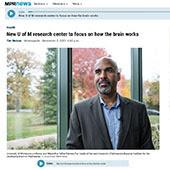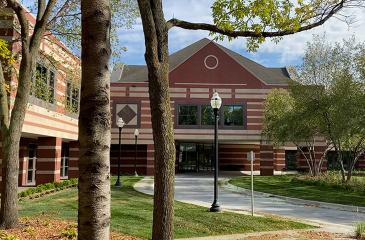The Synapse: Nov. 2021
After more than a year of renovation, the new MIDB facility opened its doors to the public on Nov. 1 (see our virtual tour). Located on East River Road near the University’s Twin Cities campus, MIDB provides a one-stop setting for children and families by housing researchers, health care providers, educators and advocates together in one location where they can enhance each other’s knowledge with the goal of improving our children's future.
- state-of-the-art, research-based brain assessment
- outpatient clinics focused on pediatric neurobehavioral conditions
- child-friendly waiting areas
- a food market with drinks and sandwiches
- quiet safe spaces
- an accessible playground and sport court
- attached parking ramp
- walking trails
- meeting, conference, and event space
Thank you for being part of MIDB and for your dedication to fostering the healthy brain function of children across the lifespan.
Damien Fair, PA-C, PhD, and Michael Georgieff, MD
MIDB Co-Directors

MIDB To Serve As a Key Data Collection, Management, and Analysis Site for the HBCD Study
The University of Minnesota has received two grants totaling $26 million from the National Institutes of Health for research on the impact of substance exposure during pregnancy on child brain and behavioral development. The first grant, totaling $6 million for the first five years of the study, establishes the U of M as one of 25 data collection sites for the HEALthy Brain and Child Development (HBCD) Study, which will enroll about 7,500 pregnant people nationwide. Researchers will collect data on substance use and other risk and protective factors during the pregnancy, and then study the impact on brain and behavioral development of the children at various time points from birth through early childhood. The second grant, totaling $20 million for the first five years, establishes a fully integrated, collaborative data analytic infrastructure for the HBCD Study. This HBCD data core will support the entire 25-site consortium in the collection of the large HBCD dataset and enable researchers to analyze brain development in substance-exposed and non-substance-exposed infants and children. Read more

ICI Leads Transition Work
The Institute on Community Integration will lead a Project of National Significance from the Administration on Community Living designed to increase independence of Minnesota’s youth and create pathways to post-secondary education and employment. Under the five-year, $1.4 million award, the Institute will collaborate with other organizations on the project A Community-Based Collaborative Transition Model for Minnesota Youth with Intellectual and Developmental Disabilities that will use a number of collaborative approaches to engage diverse community stakeholders. The team will develop a tiered framework for youth with disabilities transitioning from high school to careers, higher education, and independent community living. The person-centered, inclusive, culturally responsive framework will be designed to address the economic and educational needs of Minnesota communities. The framework will be piloted in three transition programs, in the Minneapolis, Stearns-Benton, and Rosemount-Apple Valley-Eagan public school districts. Learn more

Analyzing Big Data to Understand the Developing Brain
School of Public Health biostatistics faculty members Assistant Professor Mark Fiecas and Professor Saonli Basu are co-leading MIDB's Analytics core. They will assist with study design, data analysis, writing papers, and helping with grant submissions. "There’s so much about the developing brain that we don’t know, and the MIDB Analytics core will help accelerate progress in filling in the gaps. If we can predict risk, that could really help with developing proper and timely intervention strategies," said Basu. Read more

Growing Excitement for Philanthropic Support
Over the past several weeks, more than 75 donors and community partners have visited our new facility for an insider’s look at MIDB; meet with key leaders, faculty and staff; and learn about the profound impact this health destination will have on the community. Demonstrating the importance of community support, philanthropy and partnerships, nearly $60 million has been raised to catalyze and support the great work happening at MIDB. Our goal is to launch a philanthropic advisory council aimed at providing a platform for key champions and ambassadors to help continue to secure critical funds and resources for our first of its kind institute to set even more children and adolescents on an optimal path for success.

MPR Spotlights Opening of MIDB
Earlier this week, MPR published a story on the opening of MIDB. The story started, "A new $60 million campus in Minneapolis opened its doors today to welcome researchers and kids to help investigate an enduring mystery: How do we become who we are? The Masonic Institue for the Develolping Brain is an unsual collaboration among health care providers, neuroscientists, educators and others to probe the human brain and how it takes shape." Read and listen to the entire story.



